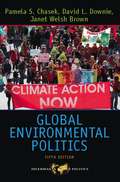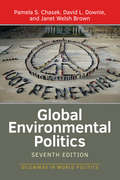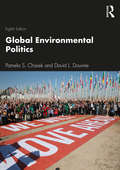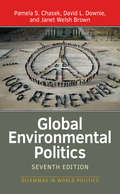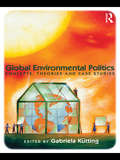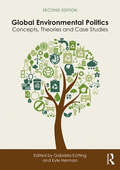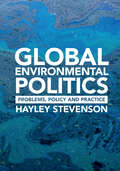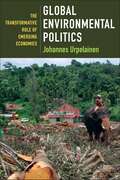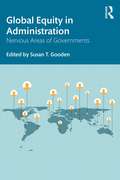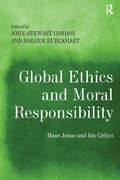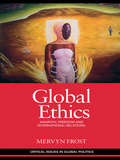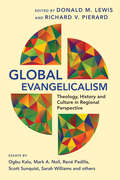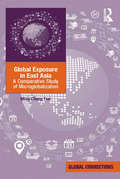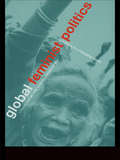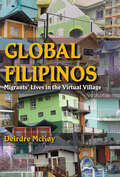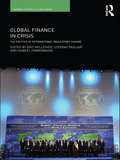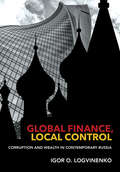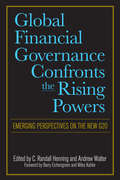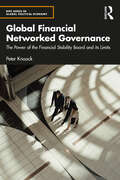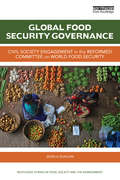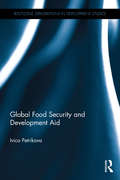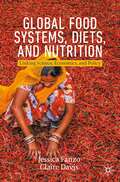- Table View
- List View
Global Environmental Politics
by Pamela S. Chasek David L. Downie Janet Welsh BrownWhen Global Environmental Politics was first published, the environment was just emerging as a pivotal issue in traditional international relations. Today, the environment is considered to be a central topic to discussions of international politics, political economy, international organization, and the relationship between foreign and domestic policy. With new and updated case studies throughout, a revised chapter on improving compliance with international environmental regimes, and a new section on environment within the larger context of sustainable development, this classic text is more complete and up-to-date than any survey of international environmental politics on the market. In addition to providing a concise yet comprehensive overview of global environmental issues, the authors have worked to contextualize key topics such as the 2002 World Summit on Sustainable Development, the Kyoto Protocol, the Stockholm Convention on Persistent Organic Pollutants, international forest policy, and the trade, development and environment nexus. Environmental concerns from global warming to biodiversity loss to whaling are seen as challenges to transnational relations, with governments, NGOs, IGOs, and MNCs all involved in the multilateral interaction that is necessary to address the ever-complicated subject of global environmental politics.
Global Environmental Politics
by Pamela S. Chasek David L. Downie Janet Welsh BrownFor more than twenty years, Global Environmental Politics has provided an up-to-date, accurate, and unbiased introduction to the world's most pressing environmental issues. This new edition continues this tradition while covering critical new developments in the field. Through case studies on key issues such as climate change, toxic chemicals, and biodiversity loss, the authors detail the development of major environmental regimes. With new material on the adoption of global Sustainable Development Goals and the 2030 Agenda for Sustainable Development; the December 2015 Paris Climate Change conference; and recent meetings of major conventions on desertification, biological diversity, and more; the authors present a comprehensive overview of contemporary international environmental politics. Global Environmental Politics is vital reading for any student wishing to understand the current state of the field and to make informed decisions about which policies might best safeguard our environment for the future.
Global Environmental Politics (Dilemmas In World Politics Ser.)
by Pamela S. Chasek David L. DownieGlobal Environmental Politics has provided an accurate, up-to-date, and unbiased understanding of the world’s most pressing environmental issues for thirty years. The eighth edition continues this practice by covering critical new developments in global environmental politics and policymaking. Updated case studies on key issues such as on climate change, endangered species, ozone depletion, desertification, whaling, hazardous wastes, toxic chemicals, and biodiversity detail the ongoing development of major environmental treaty regimes, and new case studies on mercury and marine biodiversity showcase the challenges of creating new treaties during a period of significant global change. There is also new material on the implementation of the Sustainable Development Goals, the 2030 Agenda for Sustainable Development, trade and environment, and the impact of the COVID-19 pandemic on environmental diplomacy. Updated information about global environmental trends, paradigms, and actors completes this comprehensive introduction to contemporary international environmental politics. Global Environmental Politics is vital reading for students of environmental politics and anyone wishing to understand the current state of the field and to make informed decisions about which policies will best safeguard our environment for the future.
Global Environmental Politics (Dilemmas In World Politics Ser.)
by Pamela S. ChasekFor more than twenty years, Global Environmental Politics has provided an up-to-date, accurate, and unbiased introduction to the world's most pressing environmental issues. This new edition continues this tradition while covering critical new developments in the field. Through case studies on key issues such as climate change, toxic chemicals, and biodiversity loss, the authors detail the development of major environmental regimes. With new material on the adoption of global Sustainable Development Goals and the 2030 Agenda for Sustainable Development; the December 2015 Paris Climate Change conference; and recent meetings of major conventions on desertification, biological diversity, and more; the authors present a comprehensive overview of contemporary international environmental politics. Global Environmental Politics is vital reading for any student wishing to understand the current state of the field and to make informed decisions about which policies might best safeguard our environment for the future.
Global Environmental Politics: Concepts, Theories and Case Studies
by Gabriela KüttingGlobal Environmental Politics is the perfect introduction to this increasingly significant area. The text combines an accessible introduction to the most important environmental theories and concepts with a series of detailed case studies of the most pressing environmental problems. Features and benefits of the book: Explains the most important concepts and theories in environmental politics. Introduces environmental politics within the context of political science and international relations theories. Demonstrates how the concepts and theories apply in a wide variety of real world contexts. Case studies include the most important environmental issues from climate change and biodiversity to forests and marine pollution. Each chapter is written by an established international authority in the field. ? This exciting new textbook is essential reading all students of environmental politics and will be of great interest to students of International Relations and Political Economy.
Global Environmental Politics: Concepts, Theories and Case Studies
by Gabriela Kütting Kyle HermanGlobal Environmental Politics is the perfect introduction to this increasingly significant area. This fully revised and updated new edition combines an accessible introduction to the most important environmental theories and concepts with a series of detailed case studies of the most pressing environmental problems. Features and benefits of the book: Explains the most important concepts and theories in environmental politics; Introduces environmental politics within the context of political science and international relations theories; Demonstrates how the concepts and theories apply in a wide variety of real world contexts; New case study chapters on the role of technology, the role of China, endangered species, biodiversity and the politics of conservation, the politics of food, forests, and the politics of waste; Each chapter is written by an established international authority in the field; Fully up to date with the latest topics such as climate change negotiations, transnational governance, new indicators for sustainable development goals and much more; More in-text support, such as end of chapter web links and discussion questions. This exciting textbook is essential reading for all students of environmental politics and will be of key interest to students of international relations and political economy.
Global Environmental Politics: Problems, Policy and Practice (Routledge Research In Global Environmental Governance Ser.)
by Hayley StevensonConcern about humanity's impact on the planet has never been greater, but what are the drivers of environmental change? This wide-ranging introductory textbook outlines the competing explanations of why environmental problems occur and examines the different political approaches taken to address them. Adopting a case study approach, Hayley Stevenson enables students to gain a detailed understanding of how theories and concepts are applied in practice. Diverse perspectives on a variety of contemporary environmental challenges, from climate change to hazardous waste, as well as various responses, from multilateral diplomacy to consumer-focused campaigns, provide students with an in-depth understanding of the merits and limitations of different forms of political action. Refined on the basis of classroom feedback, features include textboxes, key points, a glossary of key terms, questions, further reading suggestions and supplementary online resources. This lively book is an essential resource for advanced undergraduate and postgraduate courses on global environmental politics and environmental policy.
Global Environmental Politics: The Transformative Role of Emerging Economies
by Johannes UrpelainenEmerging economies have fundamentally transformed global environmental politics. Led by China and India, they increasingly make or break international negotiations, which now require agreement among a large number of governments with widely varied preferences. Emerging economies—which still suffer from widespread poverty and frequently struggle with policy implementation—often feel that Western-led initiatives neglect their needs. What does the global environmental policy landscape look like in the age of a rising Global South?This book explains why emerging economies have come to dominate global environmental politics and examines the implications for future international cooperation. Johannes Urpelainen shows that emerging economies continue to prioritize economic growth and often have limited institutional capacity to contain the environmental destruction that it causes. However, he argues, despite barriers to cooperation, innovative bargaining and institutional design offer a way forward. Bottom-up agreements that respect national sovereignty and invest in capacity building hold more promise than traditional top-down treaties with binding commitments.The book features detailed discussions of attempts to address hazardous chemicals, loss of biodiversity, and climate change; a comparative analysis of China and India; and case studies of nine other emerging economies around the world. Global Environmental Politics is an essential, forward-looking overview of today’s most pressing international issue.
Global Equity in Administration: Nervous Areas of Governments
by Susan T. GoodenGovernments around the world face the challenge of espousing principles of fairness but practicing inequity in their administration. Issues of equity and justice are fundamental concerns of government, and thus to public administrators, who constantly struggle to evaluate a country’s social climate and ensure equity in governance. Such evaluation is unlikely to occur in a serious way, however, if government actors are fundamentally too uncomfortable to directly engage the topic. The result, this book argues, is a context of 'nervousness,' which unless squarely acknowledged and addressed, can become debilitating and thwart progress toward achieving social equity. This volume explores and expands our understanding of the concept of nervousness in the administration of government services around the world, demonstrating the ways in which such an emotional and physical reaction can debilitate government actions that are needed to promote social equity and justice. Each of the chapters in this edited volume focuses on a single country and examines a specific nervous area of government, highlighting important historical and political considerations, as well as specific evidence of promising progress. It considers the complexity of nervous areas of governments around the world, while identifying encouraging approaches and initiatives. Global Equity in Administration is required reading for all practicing and aspiring public servants concerned with fair and equitable provision of public services around the world.
Global Ethics and Moral Responsibility: Hans Jonas and his Critics
by John-Stewart Gordon Holger BurckhartThe philosophy of Hans Jonas was widely influential in the late twentieth century, warning of the potential dangers of technological progress and its negative effect on humanity and nature. Jonas advocated greater moral responsibility and taking this as a starting point, this volume explores current ethical issues within the context of his philosophy. It considers the vital intersection between law and global ethics, covering issues related to technology and ethics, medical ethics, religion and environmental ethics. Examining different aspects of Hans Jonas’ philosophy and applying it to contemporary issues, leading international scholars and experts on his work suggest original and promising solutions to topical problems. This collection of articles revives interest in Hans Jonas’ ethical reasoning and his notion of responsibility. The book covers a wide range of areas and is useful to those interested in philosophy and theory of law, human rights, ethics, bioethics, environmental law, philosophy and theology as well as political theory and philosophy.
Global Ethics: Anarchy, Freedom and International Relations
by Mervyn FrostThis provocative and original book challenges the commonplace that contemporary international interactions are best understood as struggles for power. Eschewing jargon and theoretical abstraction, Mervyn Frost argues that global politics and global civil society must be understood in ethical terms. International actors are always faced with the ethical question: So, what ought we to do in circumstances like these? Illustrating the centrality of ethics to our understanding of global politics and global civil society with detailed case studies, Frost shows how international actors constitute one another in global social practices that are underpinned by specific ethical commitments. Case Studies examined include: The War on Iraq The ‘Global War on Terror’ Iran Human Rights Globalization and Migration The use of Private Military Companies. Global Ethics forces readers to confront their own necessary ethical engagement as citizens and rights holders in global society. Failure to understand international relations in ethical terms will lead to misguided action. This book should be read by all scholars and students of international relations as well as the general reader seeking an accessible account of the importance of ethical decisions in world affairs.
Global Evangelicalism: Theology, History & Culture in Regional Perspective
by Richard V. Pierard Donald M. LewisGlobal Evangelicalism
Global Exposure in East Asia: A Comparative Study of Microglobalization (Global Connections)
by Ming-Chang TsaiIn contrast to speculative, sweeping literature on globalization Global Exposure in East Asia grounds globalization theories in a detailed empirical analysis, providing a systematic investigation of what until now have been grand narratives of huge global phenomena. This book presents a micro-level explanation of globalization by examining individual global exposure and its influence in the values and perceptions of individuals, contending that individual and personal global experience, or 'microglobalization', is a key variable in understanding how modern mobile persons act and think in ways different from those who remain geographically immobile and constrained. Drawing on detailed empirical evidence from China, Japan, Taiwan and South Korea, Global Exposure in East Asia explores the structures of global exposure and their influences on values and identities in contemporary East Asia. A rich, comparative and grounded examination of modern theories of globalization, this book introduces an innovative perspective that highlights the significance of microglobalization in understanding quotidian lives in a context of ever expanding transnational exchanges and connectivities. As such, it will appeal to social scientists with interests in globalization, cosmopolitanism, mobility, migration and transnationalism, (national) identity and everyday life.
Global Feminist Politics: Identities in a Changing World
by Suki Ali Kelly Coate Wangui Wa GoroGlobal Feminist Politics examines the changing global context for feminist political action, its meaning and forms. It acknowledges the existence of dissent and debate among feminists, asserting that such debate leads to innovation in theory and practice. This book reaches the conclusion that the future of the women's movement depends upon a dialogue which is unafraid to cut across perceived differences.Focusing on key issues raise by a feministic commitment to global political change, this book covers subjects including:* the relevance of contemporary feminist politics for younger women* gendered accounts of genocide and catastrophe* exile, migration and diaspora* gender and the internet* women and the nationalist movement in India* gender issues in Pakistan, Australia, South Africa and the Middle East.Featuring an international panel of cutting-edge feminist thinkers, Global Feminist Politics demonstrates the innovative work being undertaken in the academic and professional worlds, as well as in women's activism. It is an invaluable resource for students in Women's Studies and Development Studies, as well as all those interested in the development of contemporary global feminism.
Global Filipinos: Migrants' Lives in the Virtual Village
by Deirdre McKayThe author of An Archipelago of Care documents the experiences of Filipino contract workers from the same village, traveling abroad for jobs.Contract workers from the Philippines make up one of the world’s largest movements of temporary labor migrants. Deirdre McKay follows Filipino migrants from one rural community to work sites overseas and then home again. Focusing on the experiences of individuals, McKay interrogates current approaches to globalization, multi-sited research, subjectivity, and the village itself. She shows that rather than weakening village ties, temporary labor migration gives the village a new global dimension created in and through the relationships, imaginations, and faith of its members in its potential as a site for a better future.“A unique and important study that adds a refreshing and necessary reminder that, on the most fundamental level, a village is part of the global world.” —Nicole Constable, author of Maid to Order in Hong Kong: Stories of Migrant Workers“A luminous, elegant, and well-argued multi-sited ethnographic study.” —Martin F. Manalansan IV, author of Global Divas: Filipino Gay Men in the Diaspora“The problems of overseas Filipino workers with loneliness; long absences from spouses, children, and other relatives; abuse by employers and governments; and efforts to use their time and talent to further individual opportunities are understood easily in McKay’s monograph. The photos of her Filipino informants . . . add a human touch to the topic of overseas workers. . . . Recommended.” —Choice
Global Finance in Crisis: The Politics of International Regulatory Change (Routledge Studies in Globalisation)
by Eric HelleinerFrom the vantage point of the key powers in global finance including the United States, the European Union, Japan, and China, this highly accessible book brings together leading scholars to examine current changes in international financial regulation. They assess whether the flurry of ambitious initiatives to improve and strengthen international financial regulation signals an important turning point in the regulation of global finance. The text: Examines the kinds of international reforms have been implemented to date and patterns of international regulatory change. Provides an analysis of change across a number of financial sectors, including the regulation of hedge funds, derivatives, credit rating agencies, accounting, and banks. Offers an explanation of contemporary regulatory developments with reference to inter-state power dynamics, domestic politics, transgovernmental networks, and/or transnational non-state forces. Providing the first systematic analysis of the international regulatory response to the current global financial crisis, this ground-breaking volume is vital reading for students and scholars of international political economy, international relations, global governance, finance and economics.
Global Finance, Local Control: Corruption and Wealth in Contemporary Russia (Cornell Studies in Money)
by Igor O. LogvinenkoExploring Russia's reentry into global capital markets at the dawn of the twenty-first century, Global Finance, Local Control shows how economic integration became deeply entangled with a bare-knuckled struggle for control over the vestiges of the Soviet empire. Igor Logvinenko reveals how the post-communist Russian economy became a full-fledged participant in the international financial sector without significantly improving the local rule of law.By the end of Vladimir Putin's second presidential term, Russia was more integrated into the global financial system than at any point in the past. However, the country's longstanding deficiencies—including widespread corruption, administration of justice, and an increasingly overbearing state—continued unabated. Scrutinizing stock-market restrictions on foreign ownership during the first fifteen years of Russia's economic transition, Logvinenko concludes that financial internationalization allowed local elites to raise capital from foreign investors while maintaining control over local assets. They legitimized their wealth using Western institutions, but they did so on their terms.Global Finance, Local Control delivers a somber lesson about the integration of emerging markets: without strong domestic rule-of-law protections, financial internationalization entrenches oligarchic capitalism and strengthens authoritarian regimes.
Global Financial Contagion
by Shalendra D. SharmaThis book is an authoritative account of the economic and political roots of the 2008 financial crisis. It examines why it was triggered in the United States, why it morphed into the Great Recession, and why the contagion spread with such ferocity around the globe. It also examines how and why economies - including the Eurozone, Russia, China, India, East Asia, and the Middle East - have been impacted and explores their response to the unprecedented challenges of the crisis and the effectiveness of their policy measures. Global Financial Contagion specifically looks at how the Obama administration's policy missteps have contributed to America's huge debt and slow recovery, why the Eurozone's response to its existential crisis has become a never-ending saga, and why the G-20's efforts to create a new international financial architecture may fall short. This book will long be regarded as the standard account of the crisis and its aftermath.
Global Financial Governance Confronts the Rising Powers: Emerging Perspectives on the New G20
by Andrew Walter C. Randall HenningGlobal Financial Governance Confronts the Rising Powers addresses the challenge that the rising powers pose for global governance, substantively and institutionally, in the domain of financial and macroeconomic cooperation. It examines the issues that are before the G20 that are of particular concern to these newly influential countries and how international financial institutions and financial standard-setting bodies have responded. With authors who are mainly from the large emerging market countries, the book presents rising power perspectives on financial policies and governance that should be of keen interest to advanced countries, established and evolving institutions, and the G20.
Global Financial Governance Confronts the Rising Powers: Emerging Perspectives on the New G20
by C. Randall Henning and Andrew WalterGlobal Financial Governance Confronts the Rising Powers addresses the challenge that the rising powers pose for global governance, substantively and institutionally, in the domain of financial and macroeconomic cooperation. It examines the issues that are before the G20 that are of particular concern to these newly influential countries and how international financial institutions and financial standard-setting bodies have responded. With authors who are mainly from the large emerging market countries, the book presents rising power perspectives on financial policies and governance that should be of keen interest to advanced countries, established and evolving institutions, and the G20.
Global Financial Integration Thirty Years On
by Geoffrey R. D. Underhill Jasper Blom Daniel MüggeA policy-relevant overview of the issues and problems involved in devising an effective global financial system for the future.
Global Financial Networked Governance: The Power of the Financial Stability Board and its Limits (RIPE Series in Global Political Economy)
by Peter KnaackGlobal Financial Networked Governance provides a careful analysis of the Financial Stability Board (FSB) and the standard-setters under its umbrella to show how such government networks harness the power of public reputation to herd their members into compliance. The FSB’s track record in coordinating global financial regulatory reform is uneven. Some items on its agenda have seen the rapid evolution of globally coordinated regulatory standards and their implementation by all member states, sometimes even ahead of the stipulated timelines. In contrast, other initiatives have stalled at different stages of the policymaking process, global coordination is lacking, deadlines have been missed, and it is currently unclear when the post-crisis financial reform project will come to completion, if ever. In this book, the author asks the question: why has the FSB succeeded in some areas of its global financial regulatory coordination work and not in others? The book traces the global policymaking process in three major issue areas: banking regulation (Basel III), over-the-counter (OTC) derivatives, and ending too-big-to-fail. Through a combination of careful process tracing and rigorous testing against alternative explanations, it challenges the existing literature by revealing that the institutional pathway of policymaking is the main predictor of FSB progress. It shows that government networks on their own have succeeded in implementing globally coherent safety standards. In contrast, legislation and legislators in key G20 countries have limited the power and effectiveness of the FSB. The author analyzes the causes and effects of this phenomenon and suggests a novel institutional solution to the effectiveness-legitimacy dilemma that global governance forums face, combining the advantages of functional specialization and electoral accountability.This book will be of great interest to graduate students; academics working at the intersection of economics, political science, and international law; students of the FSB in particular; and policymakers in global economic governance.
Global Food Security Governance: Civil society engagement in the reformed Committee on World Food Security (Routledge Studies in Food, Society and the Environment)
by Jessica DuncanIn 2007/8 world food prices spiked and global economic crisis set in, leaving hundreds of millions of people unable to access adequate food. The international reaction was swift. In a bid for leadership, the 123 member countries of the United Nations’ Committee on World Food Security (CFS) adopted a series of reforms with the aim of becoming the foremost international, inclusive and intergovernmental platform for food security. Central to the reform was the inclusion of participants (including civil society and the private sector) across all activities of the Committee. Drawing on data collected from policy documents, interviews and participant observation, this book examines the re-organization and functioning of a UN Committee that is coming to be known as a best practice in global governance. Framed by key challenges that plague global governance, the impact and implication of increased civil society engagement are examined by tracing policy negotiations within the CFS, in particular, policy roundtables on smallholder sensitive investment and food price volatility and negotiations on the Voluntary Guidelines on the Responsible Governance of Tenure of Land, Fisheries and Forests in the Context of National Food Security, and the Global Strategic Framework for Food Security and Nutrition. The author shows that through their participation in the Committee, civil society actors are influencing policy outcomes. Yet analysis also reveals that the CFS is being undermined by other actors seeking to gain and maintain influence at the global level. By way of this analysis, this book provides empirically-informed insights into increased participation in global governance processes.
Global Food Security and Development Aid (Routledge Explorations in Development Studies)
by Ivica PetrikovaAt the global level, international actors have repeatedly expressed their desire to end hunger and food insecurity. However, food insecurity has persisted. More analysis is hence needed on the link between continuously high levels of global food insecurity and the ever increasing flow of development aid. Global Food Security and Development Aid investigates the impact that development aid has had on food security in developing countries and includes international case studies on Peru, Ethiopia, India and Vietnam. It examines the effect of development aid in general and the impact of aid divided into different categories based on donor, mechanism and sector to which it is provided. In each examined relationship between aid and food security, particular attention is paid to the potentially intervening role played by the quality of national and/or local governance. The book makes policy recommendations, most importantly that donors should take greater care in considering which types of aid are suitable to which specific countries, localities, and development goals, and account for expected developments in the complex relationship between aid, food security, and governance. This book will be of considerable interest to students, researchers and policy-makers in the areas of development aid and food security.
Global Food Systems, Diets, and Nutrition: Linking Science, Economics, and Policy (Palgrave Studies in Agricultural Economics and Food Policy)
by Claire Davis Jessica FanzoEnsuring optimal diets and nutrition for the global population is a grand challenge fraught with many contentious issues. To achieve food security for all and protect health, we need functional, equitable, and sustainable food systems. Food systems are highly complex networks of individuals and institutions that depend on governance and policy leadership. This book explains how interconnected food systems and policies affect diets and nutrition in high-, middle-, and low-income countries. In tandem with food policy, food systems determine the availability, affordability, and nutritional quality of the food supply, which influences the diets that people are willing and able to consume. Readers will become familiar with both domestic and international food policy processes and actors, and they will be able to critically analyze and debate how policy and science affect diet and nutrition outcomes.
